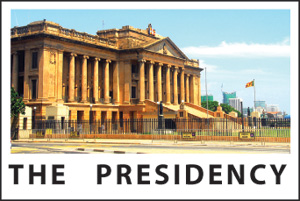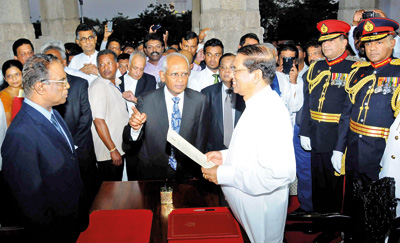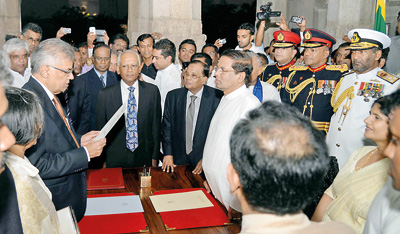News
The rights and wrongs of Sirisena presidency
Swearing in ceremonies of presidents are stately occasions. J.R. Jayewardene had his at Galle Face amidst much pomp and pageantry and Ranasinghe Premadasa’s was at the ‘Paththirippuwa’ at the Dalada Maligawa in Kandy. Both Chandrika Kumaratunga and Mahinda Rajapaksa were sworn in at the Presidential Secretariat in elaborate events that ran with clockwork precision.
The only exceptions were D. B. Wijetunga and Maithripala Sirisena. There is not even a photograph of Wijetunga’s swearing in but that is understandable; he was hurriedly sworn in, in the aftermath of the assassination of Ranasinghe Premadasa.
In contrast, Maithripala Sirisena was sworn in as the sixth Executive President of Sri Lanka on January 9, 2015 at Independence Square. It was dusk, the light was failing and Independence Square was packed with a crowd jostling for a glimpse of history being made between its carved pillars.
It was a hurriedly arranged impromptu ceremony characterised by chaos rather than order. Sirisena did not have a prepared speech, let alone an ‘address to the nation’. Flanked by Chandrika Kumaratunga and Ranil Wickremesinghe, he expressed his gratitude to the voters who elected him in a brief speech and left shortly afterwards. The event was, perhaps, a reflection of the safety concerns that prevailed at the time.
Yet, four years and ten months later, Sirisena’s swearing in can be considered emblematic of his Presidency: disorganised, chaotic, spur of the moment and crowded with too many people elbowing each other to get a ringside view.
If there was one consistent factor in the Sirisena Presidency, it was its inconsistency. Unfortunately for Sirisena himself — and Sri Lanka — he will go down in history as the President who promised so much and delivered so little and, like Mahinda Rajapaksa before him, squandered a golden opportunity to steer the country in a different direction because he chose to be a politician rather than the statesman he was supposed to be — and not a good one at that.

President Sirisena: Leaving behind a chequered legacy
The project to hoist Sirisena was born out of desperation and a fear that a third term for Mahinda Rajapaksa would create a dynastic rule that would be difficult to eradicate. If the ideological leadership came from Maduluwave Sobhitha Thera, the political impetus came from the likes of Mangala Samaraweera and Chandrika Kumaratunga. Even in that project, Sirisena was not the first choice; Nimal Siripala de Silva was reportedly approached first but he baulked at the prospect of taking on the might of Mahinda Rajapaksa.
At the time, Sirisena ticked all the boxes as the ‘common’ candidate: simple, unassuming, soft-spoken and not given to grandiose ostentation.
This made him acceptable to Ranil Wickremesinghe and the United National Party (UNP), too. After all, when Sirisena entered Parliament for the first time as a backbencher in 1989, Wickremesinghe has already been there a dozen years and was Leader of the House. Then, Sirisena addressed him as ‘Sir’- and said he will continue to do so after becoming President.
Only Wickremesinghe can honestly answer the question as to whether he believed Sirisena would really win the election or whether he was ‘outsourcing’ the candidacy expecting him to lose as he did with Sarath Fonseka in 2010. Nevertheless, the expectation was that, if Sirisena won, he would tow the UNP line, confine himself to ceremonial functions and work rapidly towards abolishing the Executive Presidency, which were the central themes of his election campaign. In other words, Wickremesinghe expected to remain ‘Sir’ to Sirisena, both literally and metaphorically.
However, in power and in office and ensconced at the Presidential Secretariat, surrounded by advisors who had their own interests at heart, Sirisena had other ideas. The first indication that the ‘yahapalana’ project was not going according to plan came when Sirisena indicated that he wanted to gain control of the party — the Sri Lanka Freedom Party (SLFP), where he had been the general secretary for fourteen years.
Ostensibly, this was to secure the support of its parliamentarians to ensure the passage of the 19th Amendment which would clip the powers of the Executive President. Even if that was the intention, the moment he returned to the SLFP after being elected on mostly UNP votes, there was an imbalance in the political equation that propelled him to power.
Sirisena also delayed the 2015 general election, insisting that the 19th Amendment had to be passed prior to that. To be fair though, the UNP did not pursue early elections earnestly either. Ironically, the 20th Amendment which would have changed the way the general election was held, is yet to be passed.
Had the 2015 general elections been held soon after the presidential election, the UNP would have benefited from the snowballing effect of that election and returned to Parliament with a working majority. Instead, it was reduced to a few seats short of a simple majority.

Historic swearing in at Independence Square on January 9, 2015 after Maithripala Sirisena won the presidential election.
In the lead up to the general elections, Sirisena made an ‘address to the nation’ stating he would never appoint Mahinda Rajapaksa as his Prime Minister, effectively undermining the party he led. If he did the unthinkable prior to the poll, he did the unpardonable after it — appointing seven candidates who were defeated at the election through the National List: Lakshman Yapa Abeywardena, S.B. Dissanayake, Mahinda Samarasinghe, Vijith Wijayamuni Soyza, Thilanga Sumathipala, Angajan Ramanathan and M.L.A.M. Hizbullah. Some of them, such as Dissanayake and Sumathipala had actively campaigned at the presidential election against Sirisena.
In the meantime, there were indications that the personal relationship between Sirisena and Wickremesinghe was also on a downward trajectory. The latter, aloof and distant at the best of times, was hell bent on doing things his way and Sirisena was complaining that he was not getting the respect his office — if not he himself — deserved.

Ranil Wickremesinghe, the key stakeholder in Mr. Sirisena's victory, being sworn in as the new premier by the new president on January 9, 2015 at Indpendence Square
A case in point in was the appointment of long-term Wickremesinghe associate Arjuna Mahendran as Central Bank Governor. Wickremesinghe insisted on the appointment and Sirisena reluctantly acquiesced. When Wickremesinghe wanted to reappoint Mahendran, who had served the remainder of former Governor Nivard Cabraal’s term even after the first reports of the Central bank bond scandal had emerged, Sirisena, however, put his foot down and refused — one of the few acts where he showed leadership and courage.
Wickremesinghe is as much to blame for the poor relationship he had with Sirisena, though the latter’s knee-jerk reactions, making spiteful public remarks against his own Prime Minister, often did not help matters.
As a result, the two partners in government were constantly at loggerheads, each with an eye to securing the political futures of their respective political parties, the SLFP and the UNP, instead of trying to secure the nation’s future.
Little wonder then that this government has little to show for its efforts over the past four and a half years except the 19th Amendment, a tolerance of dissent and a few highways and other assorted projects.
Undeniably, the 19th Amendment would probably stand out as Sirisena’s enduring legacy. When it was being enacted Sirisena was in Parliament personally lobbying MPs. When it was finally ratified with only Sarath Weerasekera voting against it, Sirisena took great pride in declaring that the 19th Amendment was his baby and declaring that he was the only leader who legislated to reduce his own powers.
In what is a sad reflection of how power changes people, in June this year, Sirisena bastardised his own baby saying that the 19th Amendment was this government’s “biggest mistake’ because it created political instability with the President and the Prime Minister pulling in two different directions.
While Sirisena was fighting with his own government, his party, the SLFP, was slowly disintegrating. He may have defeated Mahinda Rajapaksa but Rajapaksa was streets ahead in his political acumen. Slowly but surely, he was plotting his return. Hampered by Sirisena’s control over the SLFP and acting on brother Basil’s advice, he launched the Sri Lanka Podujana Peramuna (SLPP) in November 2016.
That the SLPP has grown to become what it is today in such a short time, challenging both the UNP and the SLFP, is as much a testament to Sirisena’s ineptness as a politician as much as it is to the efficiency of those in that party. It is also a reflection of the sense of disappointment voters have about the combined efforts of the UNP’s government and Sirisena’s presidency.

Mahinda Rajapaksa, whom Mr. Sirisena defeated at the 2015 election being sworn in as prime minister following the 2018 constitutional coup
The local government elections in February 2018 would have come as a rude shock to Sirisena — though not to the rest of the country. Having campaigned on a platform of attacking the UNP on the Central Bank bond scam, Sirisena found the SLFP in a distant third place, securing just over twelve percent of the vote — in effect, an ‘also ran’ in the contest.
That was probably when Sirisena realised that his presidency was a ticking time bomb, waiting to disintegrate. A month earlier, in January 2018, the Supreme Court had opined, responding to a query from Sirisena, that the 19th Amendment applied to his term of office as well and that therefore it would be five years and not six years, as he had hoped it would be.
From then on, Sirisena was looking for opportunities to extend his stay at the top. Towards this end, he began cosying up to Mahinda Rajapaksa and the Joint Opposition (JO) which in effect was the parliamentary arm of the SLPP, culminating in the disastrous constitutional coup in October last year.
That exposed Sirisena for the pseudo-democrat that he was. Here was the President who made an address to the nation vowing he would never appoint Mahinda Rajapaksa as his Prime Minister even if the United Peoples’ Freedom Alliance (UPFA) won the August 2015 general election, doing just that even when Rajapaksa did not command a majority in the House.
At the height of the crisis, Sirisena vented his venom in public, claiming that the ‘coup’ failed only because the asking price of MPs sky-rocketed to 500 million each — a tacit admission that bribery was adopted as a means of luring UNP parliamentarians.
The matter ended up in the Supreme Court where Sirisena was chastised as no other President has been, the court stating categorically that he had violated the Constitution when he dissolved Parliament. So, having said that he would never ever reappoint Ranil Wickremesinghe as his Prime Minister again even if all 225 MPs endorsed him, he had to eat humble pie and do just that.
If that was not enough egg on Sirisena’s face, there was more to come in the aftermath of the Easter bombings in April this year. There is still debate on exactly who did what and who was ultimately responsible, but certain facts that emerged in inquiries are not flattering for Sirisena.
It came to light that there were seats on flights returning from Singapore, where Sirisena was that day, when he had previously said that he couldn’t find a flight to return to Colombo immediately. It also emerged that he had not wanted Police Chief Pujith Jayasundera to attend meetings of the National Security Council after some allegations were made against him.
A similar ‘not invited’ edict was served on Premier Wickremesinghe after the events of October 2018. These measures smack of petty politics, not statesmanship, and are not deeds which even a grama niladhari would be proud of, regardless of whether they contributed to the Easter events or not. Sirisena’s credibility, already at a low ebb, nosedived.
Perhaps the one issue that Sirisena got right was probing the Central Bank bond scam. The revelations rocked the UNP lead coalition and although no one has been found guilty yet, it provided the SLPP-led opposition with much needed ammunition. That the citizenry and the media were safe will also go to his credit.
Sirisena’s critics would argue that he used the bond scam for political advantage, so he could browbeat the UNP with it. It is true that he did not pursue with the same vigour corruption allegations against the Rajapaksa regime he had so vehemently campaigned against, saying he would shut down the airport to prevent crooks from leaving the country.
The UNP and some of its ministers were also responsible for the lackadaisical attitude towards investigating corruption among its predecessors — and are paying for that dearly now — but Sirisena did not go to the length of appointing a presidential commission, for instance, to probe those acts of commission and omission because aligning with the SLPP was becoming more important.
If there was one thread that ran through the Sirisena presidency, it was its inconsistency. This is best manifested in his rallying call to reintroduce the death penalty for drug-related offences and ‘hang at least one drug dealer’ before he left office. Yet, days before he left office he did the exact opposite, pardoning a convicted murderer under questionable circumstances.
Maithripala Sirisena was entrusted with the job of executive president because he promised to be a one-term president, not to run for president again and abolish the presidency. He kept the first and second promises not because he wanted to but because he had to. He failed miserably in the third.
In many ways, Sirisena was similar to Dingiri Banda Wijetunga, the other ‘unlikely’ president who was sworn in, in a hurry. DB left office earning admiration for facilitating a smooth transition of power after seventeen years of UNP rule and was hardly heard of thereafter. Sirisena leaves office with a cloud of disillusionment hanging over him and still making noises about remaining in public life.
Maithripala Sirisena was supposed to be a president like no other, a simple man elevated to the highest office in the land by circumstance and entrusted with the task of abolishing it. Indeed, he was a president like no other, but not in the manner the people who voted him in to office wanted him to be.
That is the sad legacy that Maithripala Sirisena has left the nation, so history is unlikely to be kind to him.

